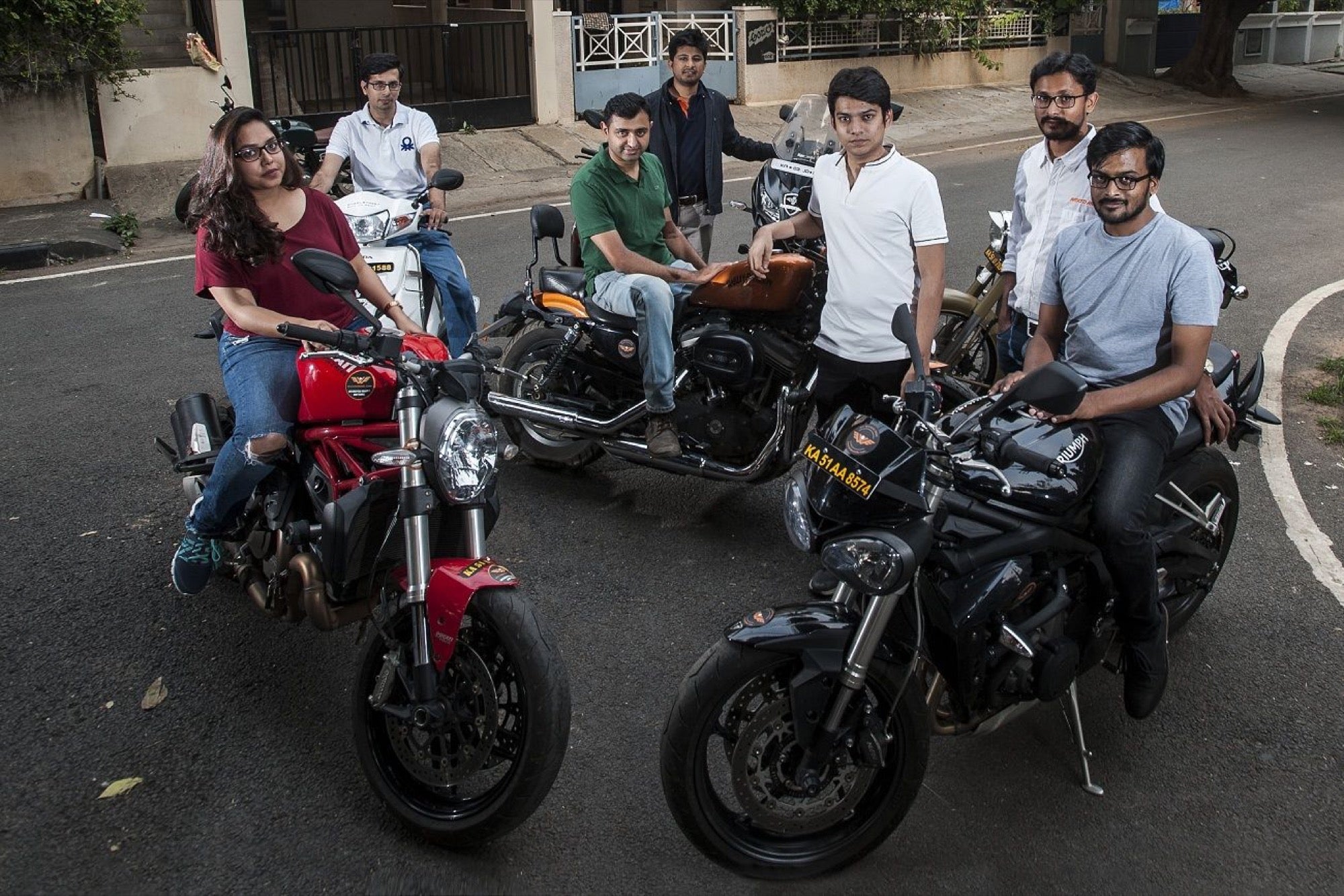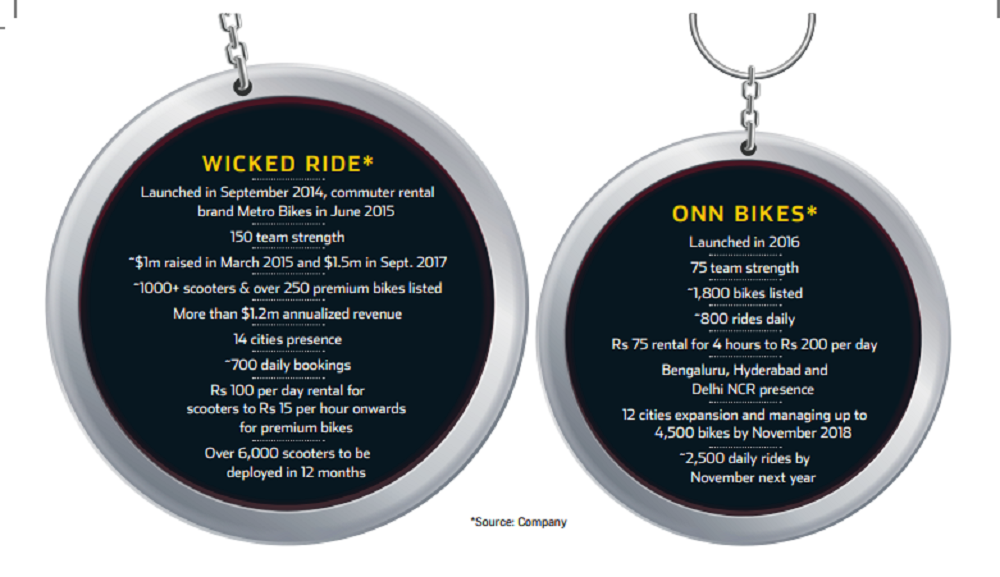These Bike Rental Start-ups are Finding Opportunities in the Other Side of Business The logical solution, however, one could think of was switching to renting commuter bikes for daily commuting
By Sandeep Soni
Opinions expressed by Entrepreneur contributors are their own.
You're reading Entrepreneur India, an international franchise of Entrepreneur Media.

Most two-wheeler rental start-ups have been thinking that the opportunity lies in high margin intercity commute by renting out premium bikes, largely over weekends. But some are discovering that, deep down, their existence lies on the other side.
Y Combinator-backed start-up Wheelstreet that rent out scooties, commuter and premium bikes had a realization two years back: the market was evolving from daily commuting to a week-or-two of adventure travel. From around 1,100 monthly bookings, Pranay Shrivastava, Co-founder of Wheelstreet, was aggressively aiming to hit around 6,000-booking mark by end of 2015. It raised $120,000 from Y Combinator in last round in September 2017.
But the biggest flaw in the premium bike rental for intercity rides was low repeat usage rate. "The order value was very high, typically around Rs 4,000 but usually the customers used to book it only once in a quarter," says Shrivastava in hindsight. The scalability issue was apparent.
Vivekananda Hallekere and Varun Agni from Wicked Ride also got their vision wrong while starting their superbikes rental service in September 2014. "We thought we can scale it up. This was largely out of our passion for big bikes and the high margin involved in renting them out," says Hallekere.
The logical solution, however, one could think of was switching to renting commuter bikes for daily commuting. This would have solved the problem of low repeat usage rate despite of low order value, for instance around Rs 100 for few hours a day, but a steady scalability was in sight. So Wicked Ride added commuter bike rental vertical - Metro Bikes in June 2015. Wheelstreet switched a bit later - during Y Combinator's 2017 summer program.
POINTLESS ROUTE
The learning to increase order bookings through weekday rentals was the right way for start-ups to augment their growth one level up. But such model concentrated on helping commuters move from point A to point A in a city. For instance, you pick a bike from a designated nearby parking for going to office in the morning and then drop it back at the same point in the evening.
You cannot drop it at a parking near your office, which is point B. So, essentially, the usability of vehicle is limited to one particular user until he/she brings the vehicle back to point A. However, in a point A to point B commute, the twowheeler is available once the commuter reaches his/her point B destination. Hence, the vehicle is not tied up to one user and so the frequency of usage of the same vehicle increases in a day.
"Point A to point A commute limits the scale of opportunity as most people daily commute from one place to another. We started with that model in mid 2015 but realized the viability of the point A to point B commute bit late, around September 2017. We should have started it at least six months back," says Anand Ayyadurai, CEO, Vogo Rentals – the scooter rental start-up.

This serves as the biggest respite for first and last mile commuting in a city – getting off from a public transport such as metro to reaching your home or office and vice versa. Otherwise people have to usually walk or hire cycle rickshaw. "Metros are facing challenge in increasing their ridership because of first and last mile connectivity problem. Bike sharing will lead to rise in adoption of mass rapid transport which would lower energy consumption, lesser vehicles on the road and eventually government expenditure will be reduced," says Agni.
The market, more so, for weekday bike sharing and rental with a conservative estimate is at least $7 billion, according to Hallekere. Another use case for two-wheeler rental start-ups to learn and execute has been over parking of their vehicles. Usually bikes are supposed to be docked at a particular parking spot where they are locked up with chains and have a person to supervise them.
Globally, bike sharing isn't a new trend. The biggest examples are Chinese unicorns Ofo (launched in India in December 2017) and Mobike which offers dockless, also called station-less bike sharing services. It means users can pick and drop bikes from designated parking spots chosen by the company instead of formal parking spots by municipalities across the city. Users can spot a bike or scooty on the map by using the app which shows the available vehicles in the vicinity. When the user confirms the booking, an OTP is shared with him/her which is typed into the keypad fitted on the vehicle to unlock and ride it.
The usual areas where shared vehicles can be parked include metro stations, petrol pumps, outside offices and housing societies, colleges, markets, malls etc., chosen by start-ups as their parking networks. After the trip, user can punch the code again to lock the vehicle. For local authorities and owners offering space for parking means incremental revenue.
TOUGH TO PEDAL
There is another understanding of such entrepreneurs in switching to daily rental service – to eat into Uber and Ola's share of short distance rides. Technology data analytics platform Kalagato reveals that fare for 75.4 per cent of Uber's rides and 71.4 per cent of Ola's rides in India is under Rs 200 category.
Typically around 7 kilometer Ola Micro or Uber Go journey costs that much. But globally that market is tapped by bicycle sharing services like Ofo and Mobike; US-based Citi Bike, London-based Boris Bikes etc. instead of two wheelers. In India, Ola Pedal, Zoomcar's PEDL, and Yulu (launched by Amit Gupta – former InMobi Co-founder) have recently started flirting with the opportunity to offer sustainable mobility solutions.

But that's because cycling culturally never died off globally unlike in India where it got relegated to primarily becoming the mode of commuting for the weaker section of the society. Moreover unless infrastructural bottlenecks including poor roads, lack of dedicated cycle tracks apart from safety concerns due to high traffic and loosely implemented laws for traffic offences are addressed, it would be tough to bring cycling back to the mainstream transportation. Also, it is not very easy to cycle every day if you have to ride even five kilometer in Indian weather conditions which is usually hot. This might restrict the growth bicycle sharing companies are looking at.
"People won't cycle for short distance commute in India. It is like basketball rental business in China would also work in India. What will work in India is a cricket bat rental business because that's soaked into our culture," says Shrivastava.
But what might work in India is electric two-wheelers which are considerably cheaper, easy to manage, low on maintenance, eco-friendly, no registration hassle etc. "I believe the market will move towards electric bicycles. But the government has to create the right infrastructure for that. Bike rental is not the right model for point A to point B connectivity," says Namit Jain, Founder, ONN Bikes.
Unlike others, Jain started with business-to-business point A to point A model. The company leased vehicles from financial institutions and offer them to companies including Swiggy, Ecomm Express before adding business-tocustomer model. "You need to be operationally sound before going to point A to point B model wherein the two-wheelers and the parking spots are required to be present across city. We have very limited parking stations," adds Jain. Despite being the latest entrant in two-wheeler rental market, Jain has scaled quickly – it has highest inventory currently among market competitors in just around 18-month period.
However, dockless two-wheeler rentals creating at least two unicorns in India seems certain – five-seven years ahead. The key would be how really last mile their service can get where users can pick vehicles right outside their home or by walking bare-minimum. And that would involve some more learning.
(This article was first published in the January issue of Entrepreneur Magazine. To subscribe, click here)










